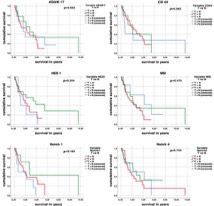Notch Signaling Pathway in Pancreatobiliary Tumors

Materials and Methods: We compared the receptors (Notch1, Notch4), activating splicing factors (ADAM17), and target genes (HES1) of the Notch pathway and progenitor cell markers with relevance for the Notch signaling pathway (CD44, MSI1) between pancreatic adenocarcinomas (PDAC, n = 14), intrahepatic cholangiocarcinoma (iCC, n = 24), and extrahepatic cholangiocarcinoma (eCC, n = 22) cholangiocarcinomas.
A significant overexpression of almost all studied components of the Notch signaling pathway can be found in the tumor tissue, however, without a significant influence on patient survival. Therefore, further studies are warranted to draw conclusions on Notch pathway's relevance for patient survival.
The paper "Notch Signaling Pathway in Pancreatobiliary Tumors" is available via Medicina, 2021;57(2):105. Authors are Francesca Borlak, Anja Reutzel-Selke, Anja Schirmeier, Julia Gogolok, Ellen von Hoerschelmann, Igor M Sauer, Johann Pratschke, Marcus Bahra, and Rosa B Schmuck.

